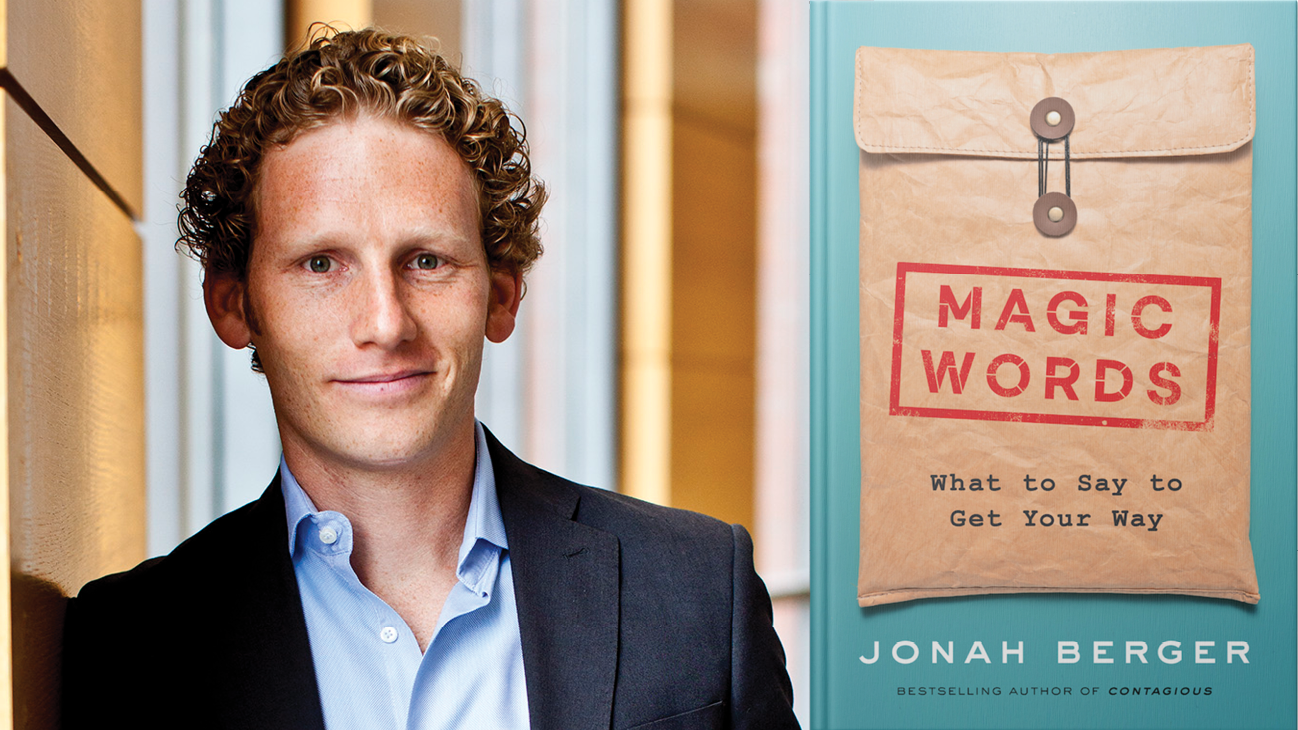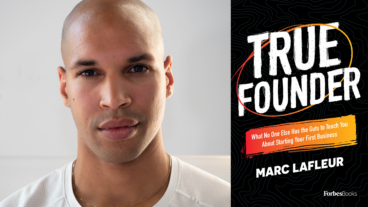Language is our most powerful tool — if we can learn how to properly wield it. In his new book, Magic Words: What to Say to Get Your Way, Dr. Jonah Berger reveals how six types of words can increase your impact in every area of life, from persuading others and building stronger relationships to boosting creativity and motivating teams.
Already a three-time bestselling author, Jonah is a marketing professor at The Wharton School of the University of Pennsylvania and a world-renowned expert on change, influence, and consumer behaviour. His fourth book — available today — explores how certain words and phrases are more effective at changing minds and driving action, as well as how the language we use can predict our behaviour.
Jonah groups these “magic words” into six types — those that activate identity, convey confidence, ask the right questions, leverage concreteness, employ emotion, and harness similarities (and differences). He recently sat down with Think Advisor, a financial services industry magazine, to discuss his new book and put some of these magic words in action.
Below is an edited version of Jonah’s Q&A. Contact us to learn more about Jonah and how he blends behavioural science with his own research to help leaders fuel growth and succeed in our rapidly changing world.
Think Advisor: In your new book, you write that small shifts in wording can change the way we communicate. What power does language hold?
Jonah Berger: We can use language to do two things: One, to influence others by how the things we say impact potential clients, spouses, colleagues, etc.
Secondly, language also reflects things about people. It says who they are and their likely future actions.
TA: One type of magic words you write about are those that convey confidence. Can you speak to that?
JB: Language isn’t just words; it’s also phrases or style. People such as startup founders or so-called “gurus” use extremely confident language — they speak with a great deal of certainty.
That’s one reason people are very likely to follow them. They think, “this person is so certain about what they’re saying that I’d have to be an idiot not to take their advice.”
Politicians also use language like this — “This is definitely true,” “This will certainly happen,” “This is absolutely the case,” Everyone agrees with this,” “This is clearly the right course of action.” This type of language suggests that they’re certain in their opinion. So, you’re more likely to listen to what they say.
TA: What signals a lack of confidence?
JB: Often people use “hedging” — certain words and phrases like “I think this is true,” or “This will probably work,” or “This might be the best course of action.”
Research finds that hedges make people less likely to take a recommendation because it makes the advice-giver seem less confident. So, ditch the hedges, unless you add a “personal hedge.” For instance, “It seems to me like this would be a good choice” versus “It seems like this would be a good choice.”
Adding the personal hedge, “to me,” makes people think you’re more confident, more certain about what you’re talking about because you’re willing to attach yourself to what’s being said.
Consequently, they’re more likely to take your advice and move forward with your recommendation.
TA: What’s the impact of using fillers, such as “you know” and “um”?
JB: Many of us have common verbal tics like that. We use them because it’s easy and fills in conversational space when we’re not sure about what to say or need a moment.
But they can undermine people’s belief that we’re right by making us seem less certain [and therefore] making them less likely to take our advice.
Words that “leverage concreteness” are magical too, you point out. Why does vague language, like “identifying the value proposition,” as you point out, have little impact?
It’s important to show that you’re listening — whether you’re an advisor, customer service agent, or a leader. People want to feel that you’ve heard them.
This is particularly important in an advising capacity, where someone is trusting you with their assets. They want to feel that you “get” them, that you understand them and that you’ve listened to them.
You show them that with specific and concrete language. For example, describing a product as “containing lots of vitamins” rather than the abstract “nutritious.”
The same thing goes for how we [compose] an email. We’re hoping people will read it. But to do that, we have to hold their attention. Using concrete language makes it easier for people to understand what you’re talking about; and as a result, they’re more likely to stay tuned.
TA: Another category is “ask the right questions.” What are the most effective types of questions?
Research finds that follow-up questions are particularly useful. They show that you listened, understand, and are responding to what someone said.
If a client says, “I think this might be what I want to do,” respond with, for instance, “Oh, interesting. Can you tell me more about that?” or, “I totally understand. I feel the same way about that. Tell me more.”
TA: Any caveats about asking questions?
JB: You always want to be careful because asking questions the wrong way can make people feel defensive. If you asked, “Why do you feel that way?” even though you might be only trying to collect information, it can seem a little like you’re attacking someone.
So sometimes it’s best to avoid using the word, “you,” because it can feel a bit accusatory.
TA: Harnessing similarities (and differences) is yet another good opportunity for magic words. You write that similar language “increases liking, trust, and a variety of positive downstream outcomes.” Please elaborate.
JB: When you use [common] words that people are more familiar with versus complex words, it’s easier for them to process, and they’re more likely to keep paying attention.
Using similar language makes us feel like we’re all a part of the same tribe — like finding out that you went to the same high school with somebody or have the same birthday.
It makes you feel that you have something in common, and you like them more — so, the more you’re going to listen to them when they make a suggestion. You [put] more trust in what they have to say because it feels like you’re similar.
Language can be a powerful tool to do that.
TA: Does using similar language extend to email conversations too?
Yes. Mirroring, or mimicking, someone’s use of language with similar language is a great way to make them feel like the two of you are more similar, which will make them more likely to listen to what you have to say.
For example, using similar language when writing back to a client can be a great way to make them feel like the two of you [have similarities], which will make them more likely to listen to [your suggestions].
This can be very subtle, like mirroring [the salutation] they use. They may say, “Hi, David,” or “Hey, David” — or just “David.”
TA: “Employ emotion” in your language, you advise. Where does that category come into the picture of client-advisor interaction?
JB: One way I think about emotion is how we hold [people’s] attention [with it]. “Hope,” for example, is a positive emotion, but it’s not a certain emotion: I’m hoping something will happen, but I’m not certain it will happen.
So using uncertain language is a great way to keep people’s attention — they’ll keep engaging because they’re trying to figure it out.
Dr. Jonah Berger dissects his new book — Magic Words — and more in his fascinating keynotes that explore innovation and change management, influence, the hidden forces that shape behaviour, how to sell anything, and more. Contact us to learn more about Jonah and to hire a keynote speaker for your next event.



